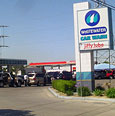Regional Banks Use Sale-Leasebacks to Boost Bottom Line
Community and Regional Banks Increasingly Look to Sale-Leaseback Transactions
By Jeffrey G. Hoppen, May 21, 2008
With current economic conditions presenting unique challenges, community and regional banks are turning to sale-leaseback transactions to monetize real estate assets and drive incremental earnings.
The subprime mortgage crisis, stock price declines, a restricted consumer loan market, and tighter funding sources are all causing banks to rethink their approaches to balance sheet management. Sale-leaseback transactions provide a route to diversification of funding sources and potentially increased shareholder value.
A second look at real estate holdings.
Industry analysts estimate that banks currently hold over $100 billion in real estate assets, nationwide. While use of a branch location or headquarters building is necessary for operation, banks are increasingly realizing that actual ownership of that property is not. Through a long-term triple-net lease, the bank can control the asset for anywhere from 25-40 years (depending on extension options) while keeping the asset off-balance sheet, if the transaction is structured correctly.
Banks are seeing that monetizing real estate can increase cash flow, which can improve financial ratios, enhance primary business operations, and capture shareholder value. The fact that real estate ownership (as opposed to control) is not strategically important to financial institutions makes the concept of eliminating these non-earning assets still more appealing.
As a result, sale-leaseback transactions are no longer viewed as a move by struggling companies in need of cash. Instead, sale-leaseback transactions have become smart financial management tools used by stable companies to rearrange their capital structure, pay off debt, and more.
The sale-leaseback transaction, defined.
During a sale-leaseback transaction, a bank may sell a single branch, a group of branches, a headquarters building, or other property to an investor. In most cases, the investor is a private equity firm with reliable access to substantial capital and a significant amount of experience in these transactions.
In the sale-leaseback process, the bank simultaneously leases the property back and maintains continuous use of the property. While the bank continues to occupy and use the real estate as before, it is no longer the property owner and can remove the asset from its balance sheet. The tenant is typically responsible for all costs of operating the real estate, including maintenance, utilities, capital expenditures and real estate taxes.
The benefits continue to mount
The reasons for a financial institution to consider a sale-leaseback opportunity are increasing as market and economic conditions change.
Because equity analysts and potential acquirers do not traditionally place the same value on real estate as do private real estate markets, these assets can potentially detract from the financial institution's equity valuation. A sale-leaseback enables the institution to convert their real estate holdings to more productive assets, thereby generating incremental earnings as follows:
- The sale-leaseback transaction often results in a substantial monetary gain, which is then amortized over the term of the lease. The result is recurring income, which is more readily valued than real estate equity.
- The sale of the asset eliminates depreciation expense.
- The cash received in the transaction can be redeployed into earning assets.
- For many smaller institutions, a higher fixed-asset percentage results in a higher regulatory capital requirement. A reduction in fixed assets can result in a reduction in capital requirements.
As an added benefit in today's troubled credit markets, a sale-leaseback transaction may offer a more dependable execution and a lower cost of funds than a traditional debt issuance.
Sale-leaseback in practice
To fully understand how a sale-leaseback transaction works, it's helpful to look at an actual transaction.
Sovereign Investment Company recently completed a $40 million acquisition of bank branches for an east coast regional bank. The bank was completing a recent acquisition of a smaller bank, but had no desire to manage real estate in far-flung locations. It was also interested in the earnings a sale-leaseback could provide.
Sovereign was able to purchase 18 locations, subject to 15-year, triple-net leases, at an 8.0% capitalization rate (which is analogous to the cost of funds) with 2% annual rent increases.
Sovereign also offered four 5-year extension options, allowing the bank to control what it viewed as important real estate for a full 35 years. The bank was able to remove the non-earning assets from its balance sheet, and redeploy the new cash into earning assets.
Transaction details tailored to needs
The terms of a sale-leaseback transaction are developed to align with the needs of the property owner. Sovereign Investment Company offers a sale-leaseback program whose adaptable terms continue to draw the attention of regional and community banks across the country.
Sovereign's program terms include:
- Lease terms ranging from ten to 20 years, with improved pricing for longer terms
- Multiple extension options, allowing the bank to control their real estate
- Triple-net lease, treated as an operating lease under GAAP
- Consideration of all types of bank real estate
- Negotiable pricing based on the quality of the credit and real estate
- Flexible lease increases
- A thirty-day transaction process beginning with contract signing and ending with closing
Summary
Today's unique combination of market trends and economic developments has created beneficial conditions for sale-leaseback transactions. For many regional and community banks, these transactions provide an ideal way to restructure a balance sheet, drive incremental recurring earnings, or help finance an acquisition.
Jeffrey G.Hoppen is a principal and Chief Investment Officer at Sovereign Investment Company, one of the largest and fastest-growing private equity firms in this arena. Sovereign has completed over $1 billion in sale-leaseback transactions to date.








